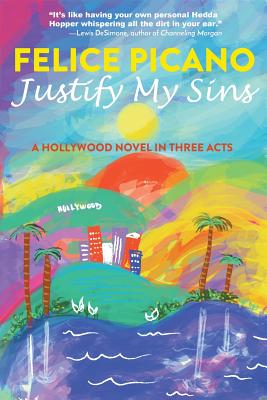 Justify My Sins: A Hollywood Novel in Three Acts
Justify My Sins: A Hollywood Novel in Three Acts
by Felice Picano
Beautiful Dreamer Press. 349 pages, $19.95
THE LATEST NOVEL by Felice Picano is about a critically respected, bestselling gay author from New York who goes to Los Angeles to work in the film industry. The three acts of the novel focus on gay life in L.A. and on the business of Hollywood at three different times: before the AIDS crisis, after it had largely passed, and in the present day, told from the perspective of an older man. The cultural observations are interesting, the sex scenes exciting, and the gossip specific and detailed. However, the most notable element of Justify My Sins is its tight focus upon its main character, for whom these adventures are mostly unimportant. Though his aloofness eventually diminishes, for most of the novel the narrator maintains an emotional distance from the action, which creates a distance for the reader as well.
Justify My Sins is clearly a novel rather than a memoir, but the life of the protagonist, Victor Regina, resembles that of the author quite closely.
That said, the cultural observations about L.A. are spot on. The novel’s descriptions of Hollywood “meetings” and the screenplay writing process ring true, as do the portraits of real people such as television executive Brandon Tartikoff and movie director Fred Perry. The travails of Victor’s novels (recognizable as Picano’s own) are instructive: “Twenty-two years under about twenty options. Twenty!”
Picano offers tales of both old Hollywood and new (though “new” is relative). Victor becomes friends with starlets of the 1930s (Gloria Stuart) and ’40s (Carol Bruce) and becomes a “walker” for Loretta Young. Anyone seeking a description of exactly how Ginger Rogers colored her hair need look no further. Even celebrities who have lost all currency—Shelley Long, anyone?—are rendered somewhat interesting. Perhaps the best story is an extended encounter with Warren Beatty and Anjelica Huston in New York at the Black Party. Strategically, Picano presents the less plausible gossip as hearsay rather than as something directly heard by Victor.
The descriptions of various gay milieus in L.A. are a mainstay of the novel. From leather scenes in Silver Lake that predate the neighborhood’s gentrification, to aging queens disporting themselves in Palm Springs, the pleasure is in the details. Victor is a sexual superhero along the lines of Molly Bolt, the hero of Rita Mae Brown’s Rubyfruit Jungle, who seduces every desirable woman that she meets. Unlike Bolt, however—a struggling filmmaker who endures great homophobia and misogyny—Victor is respected and well-off. He does not inspire much sympathy, for he doesn’t need it. He’ll have his way with the construction worker on the roof next-door and also with the two NFL stars he meets at a sex club, who make Victor the filling in their sandwich.
But these pleasures will have little impact upon our hero, whose real life lies elsewhere. Even his relationship with his longtime boyfriend Mark, whom he met in L.A., comes alive only when they’re in New York. Indeed, all of Victor’s primary emotional bonds—with friends as well as lovers—are either with characters still in New York or with New Yorkers who have gone West. In this way, the novel is reminiscent of an American Abroad genre from an earlier century, when after many adventures overseas the hero returns home to be with “my people.”
By the end of the novel, the hero starts to abandon his provincialism and to see L.A. through its own lens. To get past the death of Mark and other friends in New York, he eventually resettles in L.A. His emotional investment in the city and his relationships there begin to deepen—and his status as an older gentlemen makes him less of a superhero and more of a friend (though he still has no trouble getting whomever he wants). He even meets an Angeleno and forms an emotional connection as he stops being a tourist from the East Coast.
_______________________________________________________________
Jeff Solomon teaches English and gender studies at Wake Forest U.






